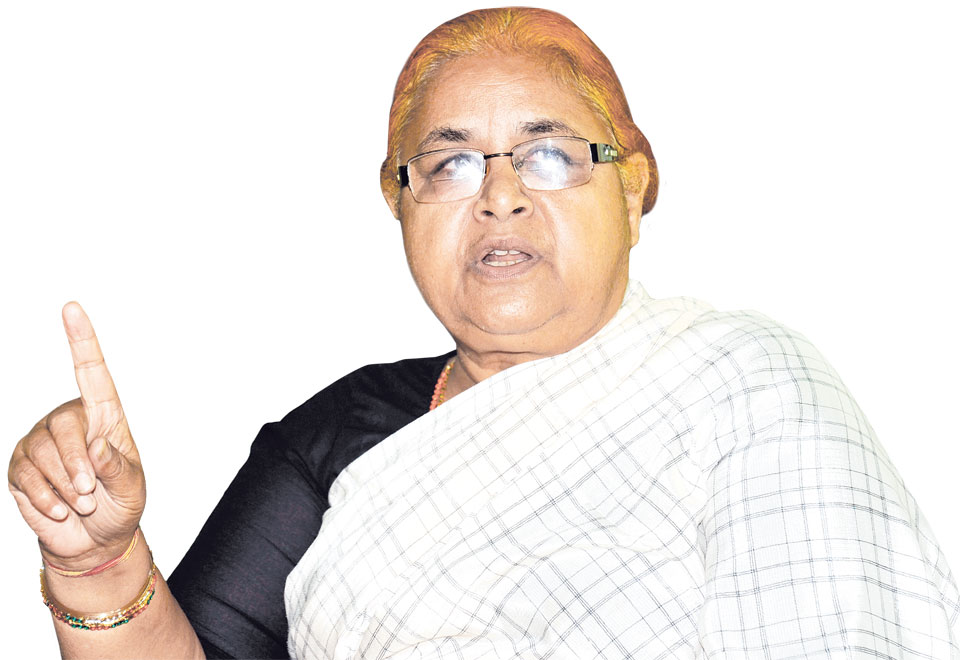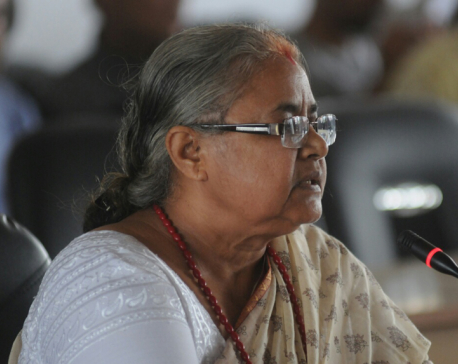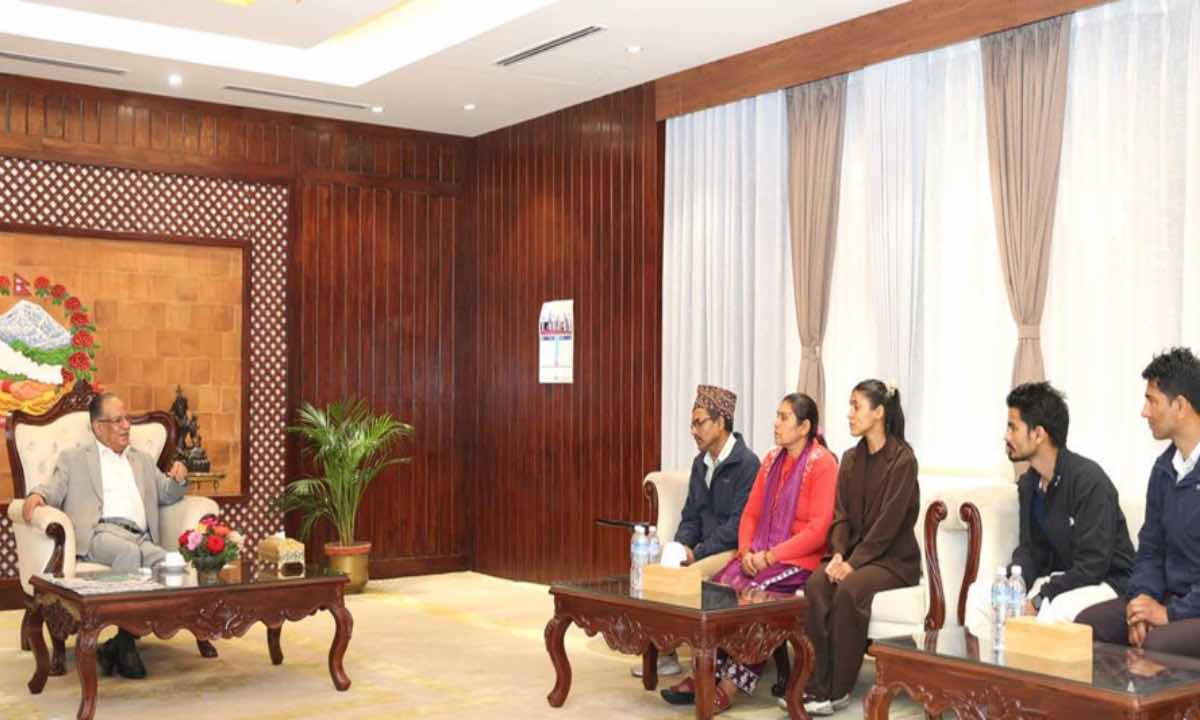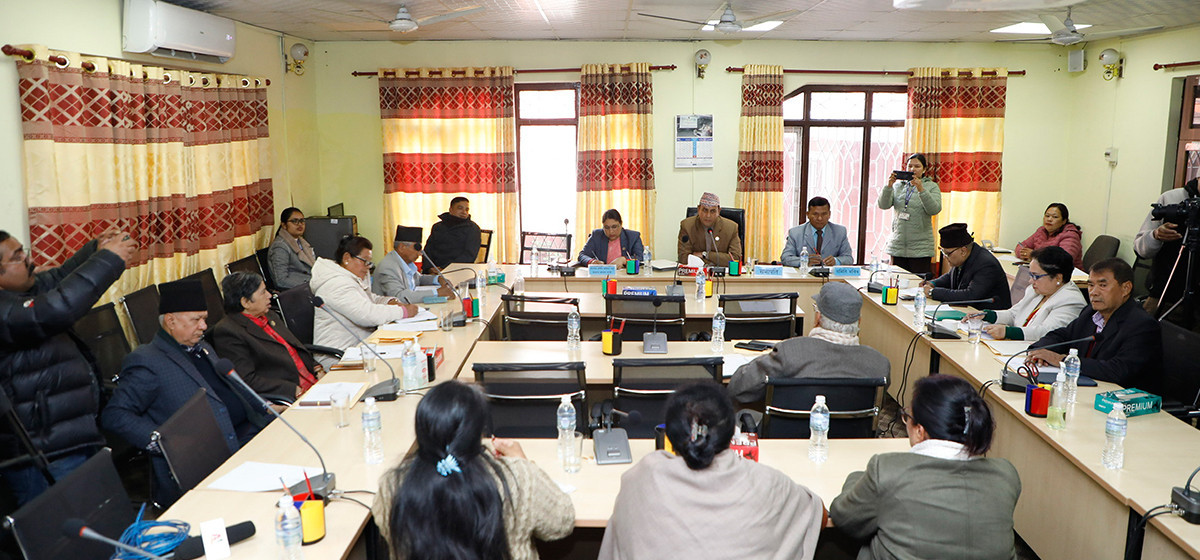
OR
The impeachment motion came to forestall verdict on Fewa Lake
Published On: August 10, 2017 06:35 AM NPT By: Republica | @RepublicaNepal

Republica and Nagarik dailies have in the past one month uncovered many cases of irregularities and corruption, amounting to billions of rupees, in our public entities. But no one has been punished so far. Is corruption in our public entities so pervasive that fighting it is a lost cause? And what is the judiciary’s role in it? Former Chief Justice Sushila Karki who during her nine months in office successfully prosecuted many senior corrupt government officials shared her insights with Mahabir Paudyal.
There is a growing perception that nearly all public entities in Nepal are corrupt. Is that the case in your experience?
Watch television programs, listen to the radio or read the newspaper, all that you get to watch, hear and read about is irregularities and corruption. This is a frustrating experience for a person like me. It was not so until three decades ago. If you went to a public office and tried bribing officials, even with nominal amounts, they would decline. Taking bribe was considered sinful. They feared law in those days. Kickbacks were limited to exchange of gifts of some kind. Now corruption has crossed all limits, so much so that you would not want to watch TV or read newspapers because that is all that you get to read. It is hard to find one corruption-free institution today.
What has contributed to this situation?
Those in power turn a blind eye to corruption. Corruption is more pronounced within the valley than outside as more powerful people live here. It is rampant, from the top to the grassroots. Those who run the executive, the legislative and the judiciary have not been serious about controlling it. Each of these organs seems to take corruption for granted. This signals failure of all three organs of the state. By allowing corruption to flourish the three organs have stripped each other naked and done great disservice to the society.
Around 50 percent of Nepali population lives under the poverty line. Data shows our poverty level is much lower. But I don’t believe it. A big chunk of our population is deprived of decent living, quality education and health services. People in power are looting them. This group which honestly pays tax is being exploited. The second group corruption has literally strangulated is the middle class. They cannot get their work done without bribing officials. A simple health service costs as much as Rs 50,000 in a good hospital. If you have no money, you should be ready to die. While this is the situation on the ground a handful of people extract resources, accumulate wealth and use it to buy votes. So there has been no progress on infrastructure development, agricultural productivity, hydropower development and so on. Development projects are either not implemented or take years to complete. All is because of corruption.
You suggest the public sector is thoroughly corrupt. But surely there are some upright civil servants.
Let me tell you my own experience. Before I became chief justice, I had to get Hal Sabik (determination of land boundaries) on a piece of land in Kathmandu. So I went to a land revenue office. I was able to get my work done after three days. What I saw and heard there left me infuriated. One staff told the other, ‘such and such woman is not ready to transfer her land’. The other replied, ‘Bury this woman on the ground, torture her and make her sign the document’. This is what they say about service seekers. There is virtually no one to listen to their grievances.
On the third day, I requested the person on duty to expedite my work as I was getting late for office. The staffer, a woman, threw my documents on the floor. I lost my temper and I scolded her, the best I could. Then her senior intervened, apologized on her behalf and proceeded with my file. If a person like me has to bear with such hassles, you can imagine the plight of commoners.
Can you tell us about the trend of filing corruption cases in our judiciary?
At one time, several cases of political corruption had been registered in the courts. The Supreme Court has also revived some cases in which the guilty were given clean chits by CIAA. Whether and how the courts deal with corruption cases also depend on the judges handling them. I and Kalyan Shrestha had convicted many people with proven corruption record. Others have given clean chits in similar cases. The case of former IGP Achyut Krishna Kharel is one such example. The court acquitted him. Compared to the past, fewer corruption cases are registered in the courts these days.
You delivered landmark verdicts on some of high-profile corruption cases. What kind of pressure did you face while you were adjudicating these cases?
The day political parties were registering the impeachment motion against me I was working on the Sudan case. They were trying to prevent me from ruling on the case but they failed. We issued the verdict at around 11 am. They registered the impeachment motion around four o’clock.
Honestly, I don’t have any firsthand experience of political pressure as I never entertained it. Those who wanted to put pressure would not talk to me directly. Perhaps they talked to my husband but nobody ever put pressure on me perhaps because they knew I would listen to no one but the law. But let me tell you about the Sudan case. This was the case that I had looked into seven times even before I was the chief justice. But it could never be concluded because some elements within the judiciary would delay it. The lawyers themselves would delay hearing sometimes by swapping benches, or by raising an unrelated issue and so on. Once a new issue emerges, the court has to look into it as well, thereby prolonging the case. During my tenure, I faced the most pressure from the Office of the Attorney General. This office often advocated on behalf of defendants (pratibadis) rather than on the government’s behalf. Perhaps they are doing the same now as well. One such case was related to Managing Director of Nepal Electricity Authority Kulman Ghising.
What was the case about? Will you elaborate?
A case had been filed against Ghising by three NEA board members who had been sacked. He was alleged to have worked against the interest of NEA. The claim was that cabinet decision to sack board members was wrong. Another accusation against Ghising was that he was working illegally by taking action against fraudulent meter readers. The sacked board members demanded stay order. The Office of Attorney General also wanted this but I declined because the terms of all three board members had come to an end.
You had also looked into Fewa Lake encroachment case. Why could this case not be resolved?
Fewa Lake encroachment is a genuine case. There was a hearing on this case on the day they filed impeachment motion against me. I was looking into it myself. In fact, when my PA informed me of impeachment, the hearing on Fewa was going on. I can say that locals of Pokhara have been done great injustice. Whenever I visited Pokhara, the locals would come and ask me to save Fewa. And there was a huge interest group determined not to let that happen. I suspect the impeachment came when it did to keep me from issuing a final verdict on Fewa encroachment. If I was in court I would have settled it by now. A similar case had been registered against Phulbari Resort. My bench had given a verdict in favor of the victims.
You have in the past spoken about non-cooperation from the legal fraternity. What was the kind of non-cooperation were you talking about?
I did my best to serve the judiciary with integrity and fairness. I stayed away from family and friend circles while working. My sole concern was upholding our judicial system. But members of legal fraternity were themselves not cooperating with me. Lawyers are social activists and their job is to advocate for justice. But they were the ones who protested against me.
So, then, even the judiciary is not immune from corruption?
Do not expect me to say yes to this question. What I can say is that we can save the judiciary from that danger as there are many good and honest judges, lawyers and advocates. Like in other sectors, there are three categories of people in the judiciary: the good, the bad and those in between. If the bad people become dominant, those in between will join hands with bad people. But if good people are given a chance, they will side with good people. The challenge today is to ensure our judiciary falls into the right hands. There are honest judges but if they are not supported, they won’t be able to do much by themselves. I fear that impeachment episode has dented the moral of all honest judges. Our politicians have set a dangerous precedent whereby any judge or chief justice not doing their bidding can be unceremoniously removed. I fear that even the few good judges we have today won’t be able to work boldly after the impeachment row.
From our conversation so far, it seems impossible to control corruption in Nepal.
Not really. I would say we can control corruption in three days but for this the head of government needs to be bold. Arrest and jail every corrupt person. Form a powerful commission comprising honest persons and let it investigate suspected corruption cases. Then throw those who have been found corrupt in jail. You will feel the difference within three days. You don’t have to go far to learn. Recall how Bihar was like 15 years ago. Forget corruption, it was not safe for women to walk outside. The goons would come to molest you in broad daylight and you could do nothing. With the determination of one single leader, Nitish Kumar, Bihar has changed a lot in the past few years.
We need to establish that every corrupt person will have to face jail time, tomorrow if not today. But in Nepal corruption convicts walk with pride. A manpower agent who has exploited Nepali workers is appointed an ambassador. Dr Govinda KC is in deathbed for reform in medical education and health and yet no politician appears concerned about his life. Even people seem to have lost their sense of judgment. Look at what happened in Bharatpur. At least those who tore ballot papers in ward number 19 should have been punished. You know who won there. And then there are our bureaucrats who do not take risk, who never challenge the politicians. They have allowed themselves to be used and manipulated by politicians. They tend to work more for petty interests of politicians than for national interests. Here chief secretary himself goes to work in an INGO.
But how can we expect to curb corruption when it has been virtually institutionalized in every sector?
The public will have to rise up. This is not happening at the moment because the network of corruption is large and every single individual connected with this network benefits in one or another way. For example, youths associated with political parties have landed contracts, misused money and have access to power. This is especially true in Kathmandu. Even those youths who have just passed SLC have amassed millions and travel in fancy cars through their access to corrupt network. Other youths who could not fight or adjust into this corrupt system have left this country to earn livelihood for themselves and their families. Those who can change this corrupt system are not in the country. Those who are here are either benefiting from this corrupt network or are powerless to alter the situation. But somebody will have to take the lead in this. I wish parties like Bibeksheel Sajha would do so. Once a broader program for political and social reform is initiated honest people from every party will join.
You recently participated in a solidarity rally for Dr Govinda KC. Are you thinking of working on such social reforms campaigns from now on?
I support the cause Dr KC is fighting. Everyone should. Some have raised question over my participation in the solidarity rally. This is unwarranted. They argue that a retired chief justice should not deliver public speeches. What the retired chief justice is allowed to do is country specific. In the Philippines, for example, a chief justice can join any sector s/he likes after retirement. In Japan and America a retired chief justice is barred from working on political sector.
By participating in Dr KC’s protest I have not done anything wrong. He is fighting for reform in health sector and medical education by putting his life on the line. And the cause he is fighting for is just. It is about ensuring people’s access to health service and medical education. Actually he is raising a human rights issue. And you expect me to keep quiet when human rights of Dr KC and the people he is fighting for are violated? Even if I had made a political statement, our constitution would excuse it as it does not bar a retired chief justice from involvement in active politics. Those who may have felt uncomfortable with my presence in that rally need to be clear about one thing. I am not going to tolerate injustice, whether I am in public office or not. If there is violence against women, I am going to speak against it. If there is irregularity, I am going to speak against it. I will keep raising my voice for broader social reform and justice. Everyone must. Some might comment on this statement as well but I am not going to keep mum when there is injustice.
You May Like This

SC stays impeachment motion against chief justice
KATHMANDU, May 5: The Supreme Court on Friday issued a stay order to parliament not to move forward with the impeachment... Read More...

House may forward impeachment motion to panel Thursday
KATHMANDU, Nov 30: Forty-two days after the registration of an impeachment motion in parliament against the now suspended CIAA chief Lokman... Read More...

CPN-UML to forge consensus in favor of impeachment motion
KATHMANDU, Oct 25: A standing committee meeting of the CPN-UML has decided to support the impeachment motion registered at the... Read More...




Just In
- Chemical fertilizers imported from China being transported to Kathmandu
- Man dies in motorcycle accident in Dhanusha
- Nepal face early setback as four wickets fall in powerplay against UAE
- Australian unemployment rate rises to 3.8 percent in March
- Gold price increases by Rs 700 per tola
- Fire destroys wheat crop in Kanchanpur, Kailali
- Bipin Joshi's family meets PM Dahal
- State Affairs and Good Governance Committee meeting today














Leave A Comment